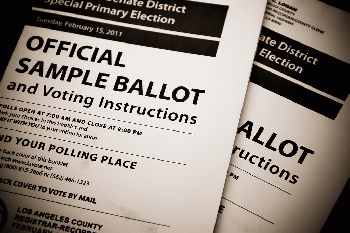A growing number of voters now register as independents, apparently not feeling that either party is satisfactory. Nevertheless, third party efforts still fail. Some blame this on the difficulty of gaining ballot access. But so, why not just make it easier to get on the ballot?
A compelling reason not to make it easier is that plurality voting easily leads to disaster when there are more than two candidates. But we still take that chance quite often.
The difficulty with plurality voting (often called the spoiler effect) is that when there are three or more candidates, voters must choose, sometimes arbitrarily, only one of two very similar candidates. The more unique candidate gains advantage and so may win the election.
Is it wise to maintain the two-party system just to help plurality voting perform better? Might it be more sensible to adopt an improved method of voting? But if so, what system would be best?
The alternative that jumps to mind is ranked-choice voting. This is because there is a well-funded organization with the mission of promoting ranked choice voting. There is little awareness other alternatives or of the fact that ranked choice voting has serious flaws, including even that it fails to avoid the spoiler effect.
Despite being less familiar, approval voting might seem a better choice. With this system, the ballot lists the candidates, and the voter indicates which ones the voter supports. The candidate with the most support wins election. This system avoids coercing voters to choose among similar candidates so the spoiler the effect is eliminated (well, maybe not entirely, but the spoiler effect does seem much less likely).
In evaluating the merits of approval voting, we should pay attention to why a voter might fail to support a candidate. True, it could mean that the voter opposes that candidate. But it could as easily mean that the voter is ambivalent about the candidate; perhaps the voter does not even recognize the candidate's name. Though this will happen only rarely for a famous candidate, (such as the nominee of a major party) an independent candidate or one from some small fledgling party, it could be more the rule than the exception.
A famous candidate will likely collect extra votes of support, merely because so few voters lack an opinion. But by the same token, there will be more voters who oppose the famous candidate. But with approval voting, opposition (just like indifference) is simply ignored. We see that counting only votes of support and ignoring opposition gives an advantage to famous candidates. In this way, like so many other voting systems, approval voting disadvantages less-known candidates and consequently we maintain the two-party duopoly. But this is an oversight. It is not a law of nature and It is not necessary.
A voting system called balanced approval voting corrects for this oversight. As with approval voting, the ballot provides the list of candidates. But with balanced approval voting, the voter is given a choice of showing either support or opposition (or neither) for each candidate. When votes are tallied for a candidate, the number of opposition votes is subtracted from the number of support votes to get the net vote. The candidate with the largest net vote wins election. One voter's opposition to a candidate cancels another voter's support and the result is that the famous candidate's structural advantage over the less known candidate vanishes. The polarization of the two-party duopoly is leveraged to give a popular third-party candidate more plausible prospects.
Suppose one of our elections used this system. Democrats would likely vote both support for the Democratic nominee while also voting opposition to the Republican nominee. Likewise, Republicans would vote for the Republican candidate and against the Democratic candidate. To the degree that there are roughly equal numbers of Republican and Democratic voters, neither of these candidates would accumulate more than a small positive net vote. And yes, some candidates would have a negative net vote. The embarrassment of having more opposition than support would be exposed.
But a popular candidate from a minor party would gain an opportunity to compete and even win election. It seems likely that a more competitive multi-party system would evolve, and polarization would diminish. With more political parties, the goal of one party taking complete control of government would seem impossible and politicians would find it more important to compromise and cooperate.
And suppose one of our primary elections used balanced approval voting. As with approval voting, voters would no longer need to guess which of several candidate is most electable. Voters could instead focus only on clarifying their judgements about the candidates, no longer distracted by worries of wasting their vote on some attractive but hopeless cause. Even candidate attitudes will likely change. Candidates will learn the danger of antagonizing voters, say with negative advertising. The costs of running campaigns may even diminish.
Balanced approval voting promotes candidate moderation while facilitating compromise. It is a promising option if we want improvement in our politics.
As a final comment, Latvia has taken the step of adopting balanced approval voting, though they have chosen a variant that disguises the negative net votes.






